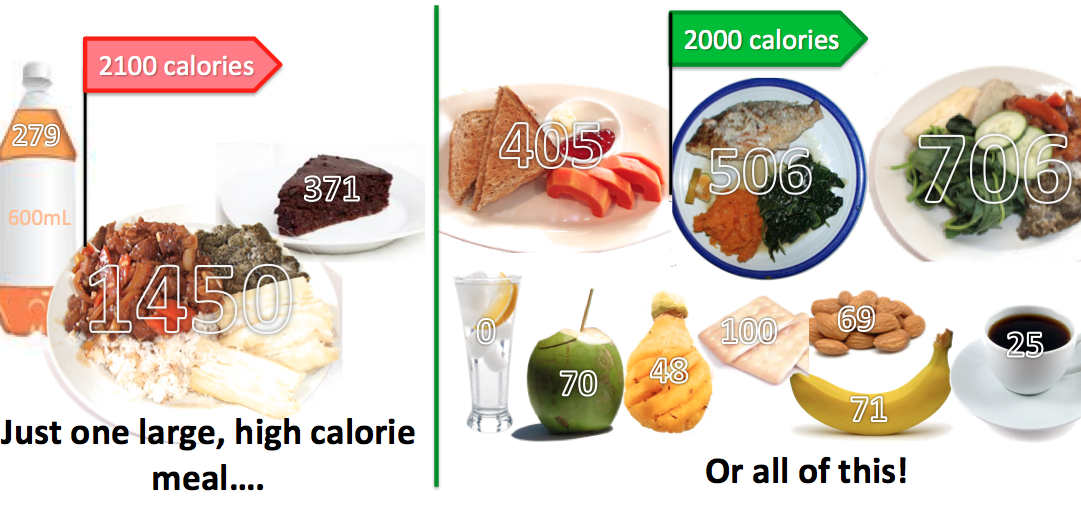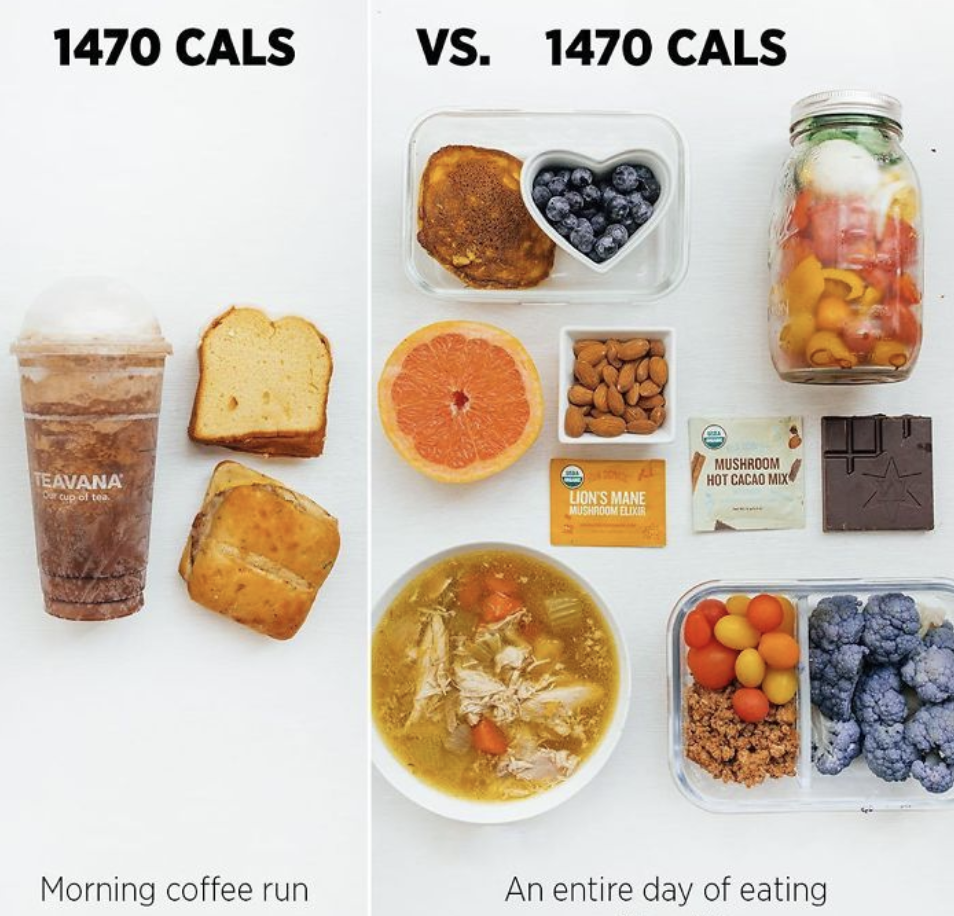Eat More, Not Less!
Do you recall a time when you were told by someone to eat less to lose weight? Well good news, according to the latest scientific research, you don’t need to! In fact, we should eat more than we think in order to improve our weight loss, weight maintenance, and even our overall health status!
According to the CDC (2021), the US obesity prevalence was at 42.4% between 2017 and 2018 and has increased by almost 12% from 2000 to 2018, while the prevalence of severe obesity and obesity related diseases increased from 4.7% to 9.2%. In addition to this, obesity has been linked to a variety conditions and chronic illnesses that could all be prevented such as heart disease, stroke, type 2 diabetes, and even some types of cancers. The CDC (2021) firmly states that these obesity related diseases are all leading causes of preventable and premature deaths, which is why it’s our responsibility to take back our health into our own hands. Although it’s a nice benefit, weight management and weight loss aren’t just about the physical aspects, but also about overall health, performance, and quality of life. Did you know that a diet rich in nutrient dense whole foods such as fruits and vegetables can help reduce the risk of heart disease, lower blood pressure, prevent some types of cancers, have a positive effect on blood sugar which can help satiety, and eating vegetables and fruits such as apples, pears, and leafy greens can help promote weight loss? (Bertoia, 2015).
As research methods have been conducted and improved over the years, the American dietary guidelines for optimal health and weight have also changed. You may recall a time when the phrase “calories in vs. calories out” may have been used to talk about how calories matter for weight loss, but research has come out to state that this way of thinking may be too simplistic, as the quality of food can be just as important when it comes to weight loss, weight maintenance, and weight gain prevention. A study conducted by Mozaffarian et al (2011), found that although calories are important, choosing high quality nutrient dense foods while decreasing the consumption of low-quality foods can help individuals consume less calories and lose and maintain weight. Try focusing on high quality nutrient dense whole foods such as fruits, vegetables, whole grains, healthy fats, and lean proteins in appropriate portions as they can help impact weight status and overall health. According to the NHS (2019), the average individual needs about 2000 calories per day for women and 2,500 calories per day for men to function optimally. 2,000 calories from quality nutrient dense foods compared to processed junk foods or fast food can look very different in terms of size, which could impact satiety throughout the day. An example of how eating more quality nutrient dense whole foods compared to a junk food diet can be found below:
Notice how the picture with whole foods has way more food with a variety of nutrients, compared to the one or two meals that fast food has to offer? This is where the theory of eating more, not less kicks in. By eating more nutrient dense whole foods, not only will you be able to eat more throughout the day, but you may also feel more satiated due to a balanced diet, and may also improve your performance, overall health, and even help with weight management. The theory of eating more, not less is also supported by other evidence-based research such as a study conducted by Hall et al (2019), which found that ultra-processed diets cause excess calorie intake and weight gain and limiting ultra-processed foods while increasing quantity of quality whole foods can be an effective strategy for obesity prevention and treatment. Another study conducted by Bertoia (2015) found that individuals who increased their fruit and vegetable intake were more likely to lose weight than those who ate the same amount, and those who decreased their intake. The data from the study suggests adding more produce into your diet to replace other refined carbohydrates such as white bread and crackers. In addition to this, they noted that whole foods such as apples, pears, soy, and cauliflower were associated with greater weight loss than starchier vegetables such as corn and peas.
Eating healthy doesn’t have to be a struggle, but we also understand that there are many challenges individuals face when trying to lead healthy and active lifestyles, so we’re here to help! Many individuals have a hard time eating healthy and sticking to it but eating healthy doesn’t mean eating boring or expensive foods. According to a study conducted by Ashton et al (2017), the most common barriers to eating healthy include access to unhealthy foods, not having the time to cook or prepare healthy foods, and not having the motivation to cook healthy foods. Although this may be so, many individuals also found common motivators for healthy eating including improved health, better body image, and increased energy. A way to eat healthy without too much thought would be focusing on adding nutrient dense foods such as fruits and vegetables, while minimizing the consumption of junk foods, fast foods, and processed foods. Although this may be so, it’s important to keep in mind that balance is key, and the key to not overeating an item is to not restrict it. (Elran-Barak et al, 2015). According to Harvard (2021), instead of obsessing or solely focusing on calories, quality should be key in determining what you should eat and avoid to maintain a healthy weight and lifestyle. Instead of choosing foods based on their caloric value, try choosing foods based off their quality and how they make you feel. Choosing high quality healthy foods, while minimizing your intake of low-quality processed foods can be more impactful in your weight loss than other approaches! (Harvard, 2021). Below you will find a graphic comparing a day filled with quality foods vs. a day filled with non-quality or low-quality foods as a reference point.
We learned how eating more quality nutrient dense whole foods can impact weight management and performance, but you may be asking yourself, “how or where do I start?” A link created by the NIH (2020), was created to show you how to change your habits for better health. The link can help you figure out where you are in the process of readiness to change, and how to help you change your health behaviors for the better if you need help and don’t know where to start! In addition to this, much evidence-based research surrounding the theory of eating more quality nutrients for weight loss have found that whole food plant-based diets, create greater weight loss than other dietary interventions, and a diet focused on quality nutrient dense whole foods can be a safe and sustainable solution to the obesity epidemic. (Greger, 2019). In addition to this, another study supporting the theory found that individuals who limit their consumption of refined grains and highly processed foods while focusing on eating a good quantity of quality nutrient dense whole foods such as fruits and vegetables without counting calories impacted weight loss positively in individuals. (Gardner et al, 2018). Lastly, the CDC (2020), has also found that replacing high energy dense foods such as processed foods with lower density foods such as fruits and vegetables can be very important in weight management.
Eating healthy doesn’t have to be boring or expensive! MyPlate (2020), suggests making a plan first, then shopping smart and checking/comparing deals to get the most bang for your buck, and finally preparing healthy meals that fit your needs and schedule. The NIH (2019), also has designed a website to help educate individuals on how to eat healthy on a budget, and even has national resources for locating help with food costs. Although caloric deficits are important for weight loss, obsessing and restricting calories can be detrimental to performance and mental health. Due to this, try focusing on quality foods in appropriate quantities for you as every body is different and needs different amounts of food for fuel. If you’ve been trying to manage your weight and haven’t been getting the results you want, try making an appointment with a dietician, nutrition educator, or medical provider to see which steps may be best for you and your body!
Keywords: Healthy habits, healthy eating, obesity prevention, chronic illness.

